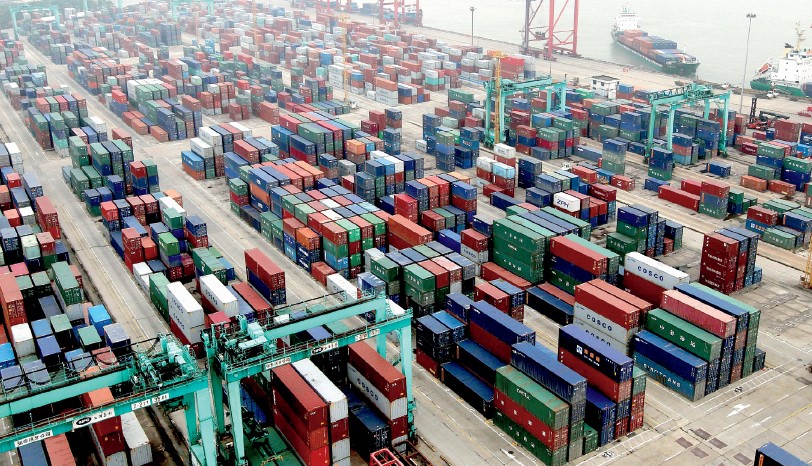|
 |
|
China's move towards quality economic growth means hi-tech products can flourish |
Inside a sea-wave-shaped building in Dalian,a coastal city in northeast China’s Liaoning Province, political leaders, business elites and economists from around the world gathered to engage with an imposing list of economic issues that have generated intense public concern. At every turn the word “reform” emerged as the mantra.
It was venue of the World Economic Forum’s Annual Meeting of the New Champions 2013, or the seventh Summer Davos, which ran from September 11 to 13 at the Dalian International Conference Center. Under the theme Meeting the Innovation Imperative, the forum focused on China’s economy as well as future measures by the new Chinese leadership.
“The new season of the Chinese economic miracle, one of better quality and higher efficiency, is unveiled,” said Chinese Premier Li Keqiang at the opening ceremony of Summer Davos on September 11.
Five years have passed since the eruption of the global financial crisis in September 2008. While the developed world is beginning to show signs of recovery, emerging economies now face the threat of slower growth. China’s GDP growth declined from 7.9 percent in the fourth quarter of 2012 to 7.7 percent in the first quarter of 2013, and then further slowed to 7.5 percent in the second quarter.
“China is moving rapidly away from quantitative growth to quality growth. In the past, it heavily depended on a resource-intensive model,” Martyn Davies, CEO of Frontier Advisory, a South Africa-based research, strategy and investment advisory firm, toldBeijing Reviewat the sidelines of the forum.
Davies believes the rest of the world, especially export-dependent countries like Australia, Brazil and South Africa, to varying degrees, would be hit by China’s slowdown.
“The current slowdown is largely policy-induced, and doesn’t mean China is now in the midst of an economic contraction. The 7.5-percent growth target is quite reasonable for the next few years,” said Adam S. Posen, President of Peterson Institute for International Economics, at the forum.
As a matter of fact, since taking office, Premier Li has laid emphasis on ensuring steady growth, adjusting the structure of the Chinese economy and advancing reform, rather than blindly pursuing high-speed GDP growth. “As long as GDP growth doesn’t fall short of 7.5 percent and the consumer price index is no higher than 3.5 percent, priority will be given to carrying out reforms and restructuring the economy,” said Yang Shubing, head of the Information Research Department at the Research Office of the State Council, in a briefing in Beijing on September 16.
To fend off the shocks of the global financial crisis, China unveiled a 4-trillion-yuan ($653-billion) stimulus package in November 2008. “Though appealing figures were registered, the economic growth at that time was qualitatively low,” said Davies.
“A short-term stimulus policy could be one way to drive up growth. But after weighing the pros and cons, such an option would not help address the underlying problems” said Premier Li.
China is at a critical stage of economic transformation and upgrading, said Li, and its prospects were promising. That was echoed by Fan Gang, Director of National Economic Research Institute under the China Reform Foundation. “The current slowdown marks the soft landing of China’s economy. By going through two or three years of structural adjustments, contradictions will be basically eliminated,” said Fan at the forum. He added that China was capable of maintaining steady growth in the second half year, but economic expansion at over 9 percent was impossible. “A growth rate floating between 7 percent and 8 percent is the new normal, while a 9-percent growth rate implies inflation and asset bubbles,” said Fan.
So far, moves to steer the Chinese economy in a new direction seem to be working. Strong rebounds were also seen in major economic indicators in August.
Consumption-led growth
For years, China’s economy has been underpinned by massive investment and foreign trade. Today, such a growth model is no longer feasible with rising local government debt and a gloomy external environment for exports. The 4-trillion-yuan stimulus package, though significant in helping China ride out of the global financial crisis, has led to structural contradictions in the economy, which need an urgent solution. As Premier Li pointed out in his speech, expanding domestic consumption is now a top priority when it comes to restructuring China’s economy.
Since the ultimate purpose of economic expansion is to improve people’s livelihood, the leading factor in driving consumption should be the people, rather than the government. “China’s economic growth has become too expensive. Due to large amounts of capital input into the economy through fixed-asset investment by the government, 5 to 6 dollars of debt is created per every dollar of growth. Inefficiency is a serious problem,” said Davies.
Adam Smith’s view that a country’s economic growth is closely linked to the size of its market means that a bigger market allows for a more defined division of labor, giving birth to more advanced and innovative technology. With rising productivity, more value will be generated, which in turn will push market expansion, said Zhang Weiying, an economics professor of Peking University, at the forum.
“China’s biggest strength consists in its huge population and market,” said Zhang. “Entrepreneurs should be encouraged to explore the new demands of consumers and create new growth points for the economy.”
The question now is how to expand domestic consumption in a more moderate way. “From the perspective of both consumers and entrepreneurs, the sense of safety is a key issue,” said Lin Yu, Co-CEO of NQ Mobile, a global Internet security service provider, at the forum. For customers, only when basic public services are provided, such as education and health care, can they really release their consumption potential; for entrepreneurs, only when a problem like intellectual property rights infringement is tackled and a competitive but fair environment is established can Chinese entrepreneurs regain the enthusiasm to innovate and make long-term investments, Lin said.
 |
|
Lin Yu (right), Co-CEO of NQ Mobile, presents a safety helmet to Zhang Weiying (left), Professor of Economics at Peking University, at a Summer Davos seminar on September 12 |
Interest rate reform
“The removal of the upper limit on deposit rates is the last vital step to completely set the banking sector free,” said Li Minxian, President of Guangdong Development Bank, at the forum. In July, China removed its floor on lending rates, but experts say removing the ceiling on deposit rates is more vital for the country to realize full interest rate liberalization. Removing the ceiling is widely considered to be the more “risky” move, however.
Despite a promise to give full play to the role of the market, the Chinese Government has been very cautious in liberalizing interest rates. “Eliminating the ceiling on deposit rates too quickly may incur fierce competition among banks, with the result being that deposit rates would shoot up much faster than lending rates,” said Hong Qi, President of China Minsheng Banking Corp., at the forum. Therefore, the interest margin would substantially shrink, forcing banks to step into high-risk fields. If these banks fail in managing risks, bankruptcy would be inevitable.
To make sure the banking sector would face the challenge smoothly, a deposit insurance system, as seen in developed countries, is needed, said Hong. More specifically, an insurance institution needs to be set up to provide financial assistance and ensure depositors can get their money back when banks are caught in crisis or on the brink of bankruptcy.
Although interest rate liberalization is fraught with risks and dangers, both commercial banks and the government insists that it is an indispensable part of China’s financial reform.
Less government intervention
Premier Li also reiterated the need to transform government functions in order to create more efficiency and less bureaucracy.
In March, the Ministry of Railways was reshuffled to create the China Railway Corp., which took over its commercial operation. Before the reform was carried out, railway operation featured a combination of government functions and enterprise management. In other words, every link of the railway business was placed under control of the Ministry of Railways, which, at the same time, was entitled to deploy railway resources nationwide.
Now, the railway sector has been pushed toward marketization, with the China Railway Corp. shouldering its debts, marking the separation of government functions from enterprise operations in the sector.
Since the beginning of this year, the Chinese Government has lessened its involvement in provincial and municipal affairs and put more decision-making power exclusively in the hands of lower level governments.
Excessive government involvement from all levels had given birth to an array of problems, such as repeated construction, mounting debts, and over dependence on the real estate market, Li Daokui, Director of the Center for China in the World Economy at Tsinghua University’s School of Economics and Management, toldChinAfricaat the forum. “Government involvement should be reduced in order to spur economic growth,” he said.
Li Rongrong, former Chairman of the State-owned Assets Supervision and Administration Commission of the State Council, believes, “Only when the government stops interfering in the business sector, can enterprises realize independent management and restraint.”CA |